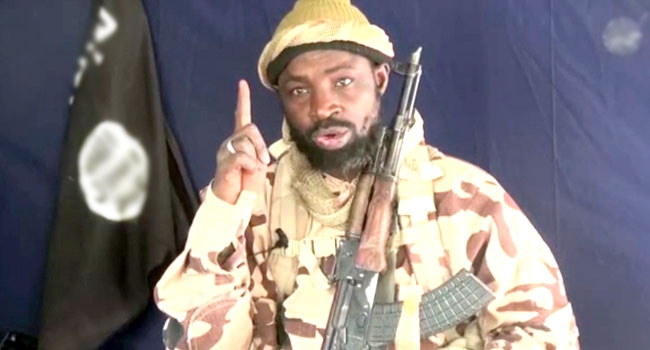Abubakar Shekau, the chief of the Africa-centred Boko Haram terror group is dead.
Nigerian media is reporting that Shekau detonated his suicide vest after he was cornered by a rival armed group.
Analysts say his death could be a turning point in the bitter power struggle between the Boko Haram and the Islamic State West Africa Province (ISWAP)
The incident took place on Wednesday evening when ISWAP assaulted Shekau’s stronghold in the Sambisa forest area. ISWAP, which had broken away from the Shekau led Boko Haram faction in 2016 after pledging allegiance to the Islamic State, raided the group’s hideout surrounding it with multiple gun mounted trucks.
According to the Nigerian news website HumAngle, after his bodyguards were killed or captured, Shekau surrendered, and tried to cut a deal with ISWAP. But after he was asked to issue a humiliating surrender statement, Shekau blew himself up, detonating a suicide vest that he was wearing. All people present during the negotiations were also instantly killed.
However, the AFP news agency is reporting another version of the event. It reported that when Shekau reached the point of no return, after being surrounded by ISWAP fighters, he shot himself in the chest, fell on the ground. While he was bleeding profusely, he was whisked away to an unknown destination by some of his surviving loyal fighters. Nigeria’s Vanguard News says that most of Shekau’s rival fighters were aged between 12 and 30. . “They are actually children of some ISWAP members killed over time,” one of the sources who was quoted said.
According to public records, Shekau became the chief of Boko Haram in 2009 following the death of the group’s founder, Mohammed Yusuf. Since then, his organisation has killed more than 30,000 people, forced around 2 million people to flee their homes and spawned one of the world's worst humanitarian crises.
Shekau and his terror organisation Boko Haram shot into global “fame” when he kidnapped 300 school girls, mostly Christians from their school in Chibok, sparking a world-wide social-media movement #BringBackOurGirls. Boko Haram is opposed to western education and its fighters often target schools.
Since the incident, Nigeria has seen several such attacks and kidnappings. In two incidents that took place in February, more than hundreds of Nigerian schoolgirls were abducted from a boarding school in the country’s north-western Zamfara state. The Government Secondary Jangebe School in Zamfara state reported as many as 300 girls were missing. However, days after the abduction, 279 of the abducted girls were released, but there is yet no news about the rest of them.




















